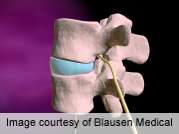Injections of teriparatide are more effective than oral bisphosphonate for bone union after instrumented lumbar posterolateral fusion in women with postmenopausal osteoporosis, according to a study published in the Nov. 1 issue of Spine.
(HealthDay)—Injections of teriparatide are more effective than oral bisphosphonate for bone union after instrumented lumbar posterolateral fusion in women with postmenopausal osteoporosis, according to a study published in the Nov. 1 issue of Spine.
Seiji Ohtori, M.D., Ph.D., from Chiba University in Japan, and colleagues examined the clinical efficacy of teriparatide for bone union in 57 women with osteoporosis diagnosed with degenerative spondylolisthesis who underwent decompression and one- or two-level instrumented posterolateral fusion with a local bone graft. Patients were divided into a teriparatide treatment group (29 patients receiving daily subcutaneous injection of 20 µg teriparatide) or bisphosphonate group (28 women receiving weekly oral administration of 17.5 mg of risedronate).
The researchers found that pain scores improved after surgery but that there were no significant between-group differences. In the teriparatide group, the rate of bone union was 82 percent, compared with 68 percent in the bisphosphonate group, and the average duration of bone union was eight and 10 months, respectively. Both the rate of bone union and average duration of bone union were significantly superior in the teriparatide group versus the bisphosphonate group.
"The teriparatide-treated patients showed superior results in the rate of bone union and average duration of bone union compared with the bisphosphonate-treated patients," the authors write. "We think that teriparatide can enhance spinal fusion in patients with osteoporosis."
More information:
Abstract
Full Text (subscription or payment may be required)
Journal information: Spine
Copyright © 2012 HealthDay. All rights reserved.




















